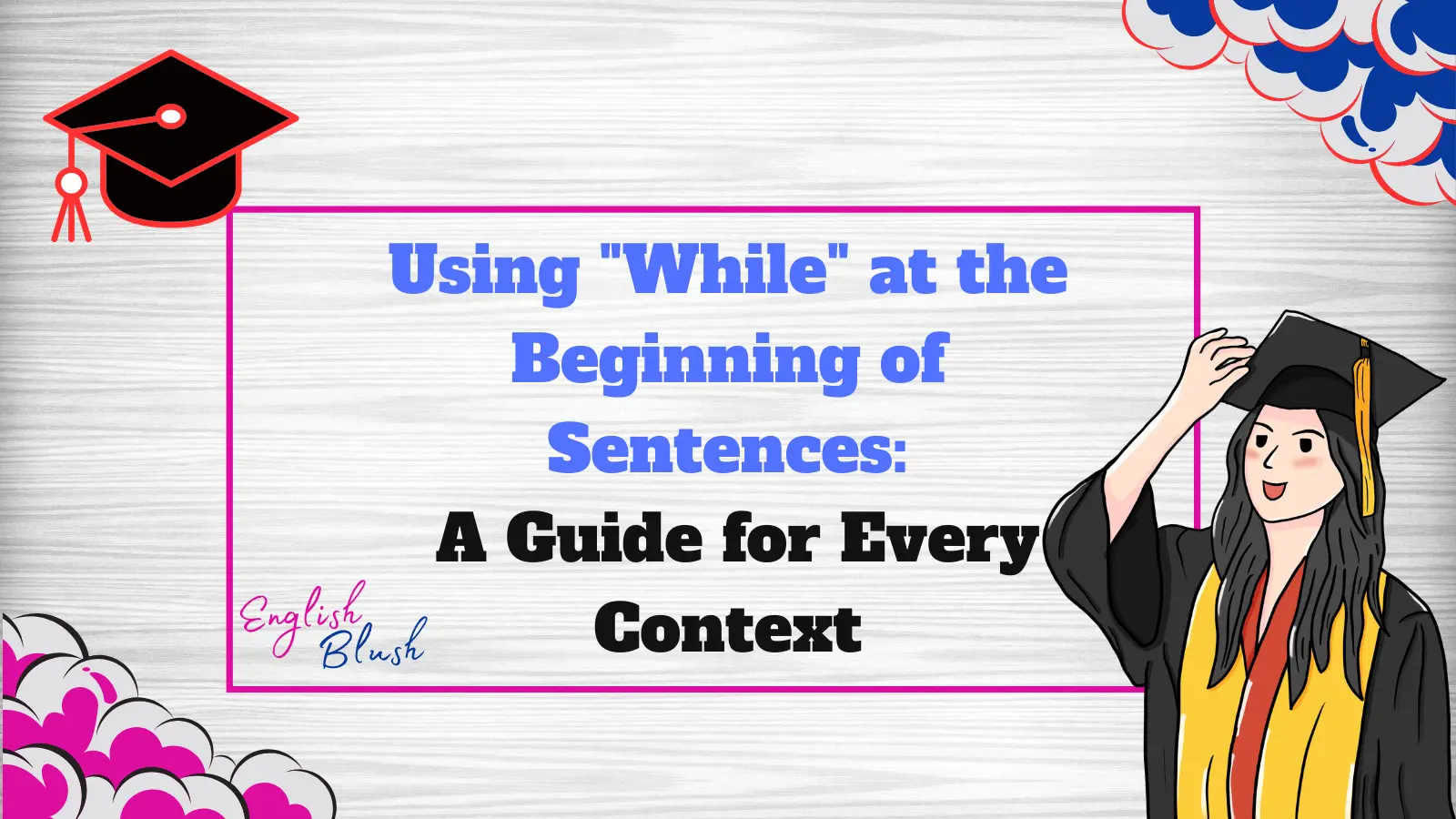The word while is a versatile part of the English language. It can mean “during the time,” “although,” or “whereas.” Knowing how to use while correctly at the beginning of a sentence helps improve clarity and style. This guide explores its uses in both formal and informal contexts and offers examples and alternatives.
When Can You Use “While” at the Start of a Sentence?
Many people wonder if it is okay to start a sentence with while. The simple answer is yes! However, you must understand its meaning and the tone you want to set. In different contexts, it can make a statement more professional, relatable, or clear.
Common Uses of “While”
There are three main meanings of while:
- To show time (temporal meaning)
- To show contrast (concessive meaning)
- To compare two things (comparative meaning)
Let’s look at these one by one with examples.
1. Using “While” to Show Time
You can use while to describe actions happening at the same time. This is especially common in storytelling or day-to-day conversations.
Examples:
- Formal: While the meeting was in progress, the team continued to take notes.
- Informal: While I was cooking, my phone kept buzzing.
Using while this way creates a smooth flow when describing events. It is an alternative to phrases like as, during, or at the same time as.
Alternatives:
- As: As I worked on the report, I listened to music.
- During: During the meeting, questions were raised.
2. Using “While” to Show Contrast
While can also mean although. This usage works well for formal and informal settings.
Examples:
- Formal: While the proposal was innovative, it was not practical.
- Informal: While I love pizza, I can’t eat it every day.
This meaning highlights opposing ideas in a sentence. It’s great for balanced arguments or explaining contradictory points.
Alternatives:
- Although: Although it’s sunny, it feels cold.
- Though: Though I enjoy hiking, I prefer swimming.
3. Using “While” to Compare Two Ideas
When while means whereas, it highlights differences between two things or people. This is useful for formal writing, especially essays or reports.
Examples:
- Formal: While some people prefer coffee, others enjoy tea.
- Informal: While he likes action movies, I enjoy comedies.
This style adds clarity when making comparisons. Use it to express opinions or explain different perspectives.
Alternatives:
- Whereas: Whereas I support the new policy, others disagree.
- On the other hand: On the other hand, their methods seem outdated.
Tips for Formal and Informal Writing
In Formal Writing:
- Make sure the sentence sounds clear and logical.
- Avoid overusing while. Instead, use alternatives like although or whereas for variety.
Example:
- Too much repetition: While the data shows improvement, while we have fewer errors, while employees are satisfied…
- Improved: While the data shows improvement, employees are satisfied, and errors are fewer.
In Informal Writing:
- Feel free to use while in a relaxed tone.
- Combine it with casual phrases for storytelling.
Example:
- Formal: While I was preparing the agenda, I also reviewed last month’s performance.
- Informal: While I made dinner, I caught up on my favorite show.
Common Mistakes and How to Fix Them
Mistake 1: Using “While” Without a Clear Link
- Wrong: While we agreed on the plan.
- Right: While we agreed on the plan, there were some concerns raised.
While always needs two related ideas in the same sentence. Otherwise, it feels incomplete.
Mistake 2: Mixing While with Unrelated Words
- Wrong: While reading the report, errors should be corrected immediately.
- Right: While reading the report, I noticed several errors.
Make sure the subject of the sentence matches the action.
Final Thoughts: Why Learning “While” Matters
Using while correctly at the start of a sentence can improve your communication in both formal and casual settings. Whether you’re writing an essay, giving a speech, or chatting with friends, it’s a helpful tool to connect ideas.
Summary of Alternatives to “While”
| Meaning | Examples | Alternatives |
|---|---|---|
| To show time | While cooking, I listened to music. | As, during, at the same time as |
| To show contrast | While it’s fun, it’s also tiring. | Although, though |
| To compare ideas | While I prefer cats, my sister loves dogs. | Whereas, on the other hand |
Mastering the use of while will add polish to your writing. Experiment with it in different situations, and don’t hesitate to mix in synonyms to keep things engaging!





